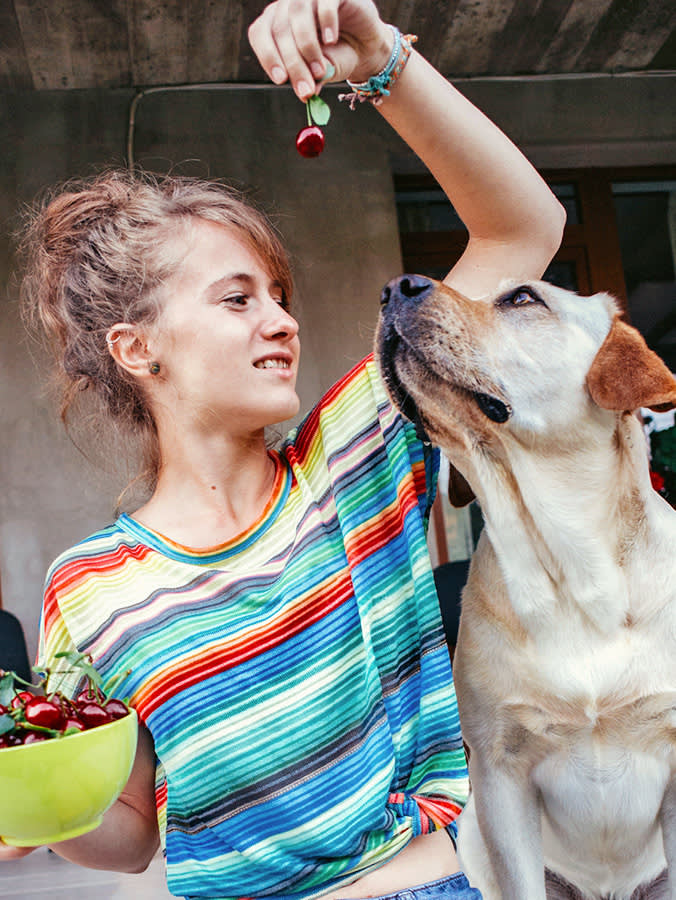Can Dogs Eat Cherries?
As long as it’s not on top of a cake, the answer is yes

Share Article
As pet parents, we always strive to provide the best for our four-legged family members, ensuring their meals are both nutritious and safe. Among the many human foods that dogs show interest in, fruit often stands out, and in particular, cherries.
With their vibrant colour and sweet-tart flavour (and ball-like appearance), cherries are a summertime favourite for many – and dogs want in. But when those irresistible puppy-dog eyes look up at you, it’s essential to know if cherries are safe for your canine companion.
Understanding the pros and cons will help you make an informed decision about including cherries in your dog’s diet. So, we dive into the details and discover if this delicious fruit can be a safe and healthy treat for your furry friend.
Can dogs eat cherries?
Yes, dogs can eat cherries in moderation. However, there are several caveats that need to be taken into consideration when feeding your pup cherries. When feeding your dog the fleshy part of a cherry, the fruit can be a nutritious snack rich in vitamins, minerals and fibre, which can benefit a dog’s overall health and support their immune systems: cherries are particularly high in vitamin C, potassium and polyphenol antioxidantsopens in new tab.
However, the pit (stone), stem and leaves of a cherry all contain cyanide, which is toxic to dogs. So you must always ensure the cherries are fresh, with the stalk, stone and leaves removed, and cut into small, manageable pieces to prevent choking.
With the high sugar content in fruit in general, the fleshy part of the cherry should only be given as an occasional treat to avoid potential weight gain and other health issues. Make sure to also monitor your dog for any adverse reactions, as some dogs might be allergic to cherries.
Nutrition facts: cherries for dogs
Cherries are packed with essential nutrients that can be beneficial for your dog. Here’s a breakdown of the key vitamins and minerals found in cherries and their benefits for your dog:
Vitamin C: boosts the immune system and acts as an antioxidant. A small handful of cherries provides 14 percent of the recommended daily amount of vitamin Copens in new tab (for humans).
Vitamin B6: supports brain development and function.
Polyphenolsopens in new tab: a group of plant chemicals that help fight cellular damage, reduce inflammation and promote overall health.
Fibre: aids in digestion and promotes a healthy gut.
Magnesium: a mineral that plays a key role in regulating several functionsopens in new tab in the body, including protein synthesis, muscle and nerve function, blood glucose control and blood pressure regulation.
Are cherries good for dogs?
Whilst cherries aren’t a necessary part of a dog’s diet, they do offer some additional nutritional benefits for dogs when prepared correctly (in small pieces, without the stalk, stone or leaves) and fed in appropriate amounts for several reasons:
Rich in potassium: cherries are packed with potassium, essential for maintaining healthy blood pressure and optimal heart function.
Energy booster: the natural sugars in cherries can provide a quick energy boost, making them an excellent treat for active dogs.
Supports skin and hair health: the variety of vitamins and minerals in cherries promotes overall skin and coat health, contributing to shiny and well-nourished fur.
Can dogs eat all parts of a cherry?
No, dogs should not eat cherry leaves, stalks or stones (pits). These parts of the cherry not only pose a choking hazard to your dog but also contain cyanide, which is poisonous for dogs. Cyanide is a toxin that, although only present in small amounts in cherries, is particularly released when chewed. In large enough quantities, it can cause difficulty breathing, dilated pupils, seizures, comas or even death.
Always remove the leaves, pits and stalks before offering cherries to your dog, and serve only the flesh in bite-sized pieces to prevent choking. When first giving your pup cherries, monitor signs of allergic reaction – which could include vomiting, diarrhoea, sudden onset of itching ears, eyes or nose, and rashes on the skin – as some dogs may have adverse reactions to certain fruits and vegetables.
Are cherries completely safe for dogs?
Whilst the fleshy part of a cherry can be a nice additional treat, there are some considerations to keep in mind:
High sugar content: cherries are high in natural sugars, which can lead to weight gain or dental issues if consumed in large quantities. Moderation is key.
Digestive upset: some dogs may experience stomach upsetopens in new tab, including diarrhoea or vomiting, after eating cherries, especially if it’s their first time.
Allergies: introduce any human foods gradually and monitor your dog’s reaction, as some dog’s can be allergic to cherries. Symptoms of a cherry allergy in dogs can include vomiting, diarrhoea, itching ears, eyes or nose, and rashes on the skin.
Processed cherries: avoid giving dogs tinned cherries or cherries in syrup (such as maraschino cherries), as these often contain added sugars and preservatives that can be harmful to dogs.
Dried cherries: when fruits are dried, the water content is removed, leading to a higher concentration of sugars, which makes them unsuitable for dogs. Store-bought dried fruits also often contain additives that can be toxic to dogs. In the mildest cases, consumption can cause vomiting and diarrhoea, but in severe cases, dried-fruit poisoning can lead to kidney failure.
Other fruits that are safe for dogs
In moderation, several other fruits and vegetables are safe and beneficial for dogs:
Rich in antioxidants and vitamin C, blueberries can help boost your dog’s immune system.
Bananas are a nutritious snack high in potassium, fibre and magnesium.
The high water content in pineapple makes it a great nutritious and hydrating summertime treat.
Other fruits that are dangerous for dogs
However, some fruits, or parts of fruits, can be harmful or even toxic to dogs and should be avoided:
Grapes and raisins are a big no-no for dogs: they have the potential to cause serious damage, including kidney failure.
Dogs should also avoid avocados. The millennial fave contains persin, a substance that can be toxic to dogs and may lead to vomiting and diarrhoea.
Much like cherries, the seeds in pears, watermelon and apples also contain cyanide, which is dangerous in large quantities. Always remove seeds before feeding these fruits to your dog.
The bottom line: can dogs eat human food?
While certain human foods can be safe and beneficial for dogs, it’s important to offer them sparingly (as a rule, treats should form less than 10 percent of your dog’s caloric intake) and consult your vet beforehand. Not all foods that are nutritious for humans are appropriate for dogs, and some may be harmful. Introduce new foods gradually, starting with small portions, and monitor your dog’s response.
Frequently asked questions
How many cherries can a dog eat?
Small amounts are best, in keeping with your dog’s size. One cherry is enough for a small dogopens in new tab such as a Chihuahua or Shih-Tzu, but a handful of bite-sized pieces is OK for a German Shepherd or a Labrador Retriever size (once in a while as a treat is ideal as a maximum). Too many cherries could cause digestive issues due to the high sugar content.
Is it OK to give dogs cherries?
Yes, it is OK to give dogs cherries in moderation. Make sure they are freshly prepared, and you are only giving them the flesh part of the fruit, and not the stalks, pit or leaves.
Why do dogs like cherries?
Dogs might enjoy the juicy taste of cherries, as well as its bursting texture when chewed. The natural sugars make it a tasty treat for many dogs when given in moderation.
Are cherries good for dogs?
In moderation, cherries are good for dogs. They provide additional essential vitamins, minerals and fibre that can be a great way to supplement their diet for overall health and wellbeing.
Can dogs eat all parts of a cherries?
No, dogs should not eat all parts of a cherries. The leaves, pit and stalks are not safe for dogs to consume and can cause poisoning in your dog. Only the flesh of a cherry should be given to your pup, and it should be prepared properly by chopping into small pieces to avoid any potential health risks.
References:

Orla Pentelow
Orla Pentelow is Kinship UK’s Senior Editor. She has previously written for British Vogue, Bustle, Yahoo and The Telegraph. When not at her desk liking dog videos she’s out and about with her rescue pup, Luna, who works primarily as chief distractor.
Related articles
Can Dogs Eat Pineapple?
Whip out the Hawaiian shirt, pineapple is a go for dogs
Can Your Dog Eat Watermelon?
Yep, you can share watermelon with your pup – but there are a few safety tips to keep in mind
![Girl with plate of kiwi sitting at table stroking dog]()
Can My Dog Eat Kiwi?
Your dog can snack on this fibre-fuelled fruit but don't go all out...
![australian sheepdog looks up longingly at a plate of pancakes]()
Can Dogs Eat Pancakes?
Are pancakes safe for your pup or should you keep them away from the flipping fun?








